- Home
- G. K. Chesterton
The Man Who Knew Too Much Page 6
The Man Who Knew Too Much Read online
Page 6
VI. THE HOLE IN THE WALL
Two men, the one an architect and the other an archaeologist, met onthe steps of the great house at Prior's Park; and their host, LordBulmer, in his breezy way, thought it natural to introduce them. Itmust be confessed that he was hazy as well as breezy, and had novery clear connection in his mind, beyond the sense that anarchitect and an archaeologist begin with the same series ofletters. The world must remain in a reverent doubt as to whether hewould, on the same principles, have presented a diplomatist to adipsomaniac or a ratiocinator to a rat catcher. He was a big, fair,bull-necked young man, abounding in outward gestures, unconsciouslyflapping his gloves and flourishing his stick.
"You two ought to have something to talk about," he said,cheerfully. "Old buildings and all that sort of thing; this israther an old building, by the way, though I say it who shouldn't. Imust ask you to excuse me a moment; I've got to go and see about thecards for this Christmas romp my sister's arranging. We hope to seeyou all there, of course. Juliet wants it to be a fancy-dressaffair--abbots and crusaders and all that. My ancestors, I suppose,after all."
"I trust the abbot was not an ancestor," said the archaeologicalgentleman, with a smile.
"Only a sort of great-uncle, I imagine," answered the other,laughing; then his rather rambling eye rolled round the orderedlandscape in front of the house; an artificial sheet of waterornamented with an antiquated nymph in the center and surrounded bya park of tall trees now gray and black and frosty, for it was inthe depth of a severe winter.
"It's getting jolly cold," his lordship continued. "My sister hopeswe shall have some skating as well as dancing."
"If the crusaders come in full armor," said the other, "you must becareful not to drown your ancestors."
"Oh, there's no fear of that," answered Bulmer; "this precious lakeof ours is not two feet deep anywhere." And with one of hisflourishing gestures he stuck his stick into the water todemonstrate its shallowness. They could see the short end bent inthe water, so that he seemed for a moment to lean his large weighton a breaking staff.
"The worst you can expect is to see an abbot sit down rathersuddenly," he added, turning away. "Well, au revoir; I'll let youknow about it later."
The archaeologist and the architect were left on the great stonesteps smiling at each other; but whatever their common interests,they presented a considerable personal contrast, and the fancifulmight even have found some contradiction in each consideredindividually. The former, a Mr. James Haddow, came from a drowsy denin the Inns of Court, full of leather and parchment, for the law washis profession and history only his hobby; he was indeed, amongother things, the solicitor and agent of the Prior's Park estate.But he himself was far from drowsy and seemed remarkably wide awake,with shrewd and prominent blue eyes, and red hair brushed as neatlyas his very neat costume. The latter, whose name was Leonard Crane,came straight from a crude and almost cockney office of builders andhouse agents in the neighboring suburb, sunning itself at the end ofa new row of jerry-built houses with plans in very bright colors andnotices in very large letters. But a serious observer, at a secondglance, might have seen in his eyes something of that shining sleepthat is called vision; and his yellow hair, while not affectedlylong, was unaffectedly untidy. It was a manifest if melancholy truththat the architect was an artist. But the artistic temperament wasfar from explaining him; there was something else about him that wasnot definable, but which some even felt to be dangerous. Despite hisdreaminess, he would sometimes surprise his friends with arts andeven sports apart from his ordinary life, like memories of someprevious existence. On this occasion, nevertheless, he hastened todisclaim any authority on the other man's hobby.
"I mustn't appear on false pretences," he said, with a smile. "Ihardly even know what an archaeologist is, except that a ratherrusty remnant of Greek suggests that he is a man who studies oldthings."
"Yes," replied Haddow, grimly. "An archaeologist is a man whostudies old things and finds they are new."
Crane looked at him steadily for a moment and then smiled again.
"Dare one suggest," he said, "that some of the things we have beentalking about are among the old things that turn out not to be old?"
His companion also was silent for a moment, and the smile on hisrugged face was fainter as he replied, quietly:
"The wall round the park is really old. The one gate in it isGothic, and I cannot find any trace of destruction or restoration.But the house and the estate generally--well the romantic ideas readinto these things are often rather recent romances, things almostlike fashionable novels. For instance, the very name of this place,Prior's Park, makes everybody think of it as a moonlit mediaevalabbey; I dare say the spiritualists by this time have discovered theghost of a monk there. But, according to the only authoritativestudy of the matter I can find, the place was simply called Prior'sas any rural place is called Podger's. It was the house of a Mr.Prior, a farmhouse, probably, that stood here at some time or otherand was a local landmark. Oh, there are a great many examples of thesame thing, here and everywhere else. This suburb of ours used to bea village, and because some of the people slurred the name andpronounced it Holliwell, many a minor poet indulged in fancies abouta Holy Well, with spells and fairies and all the rest of it, fillingthe suburban drawing-rooms with the Celtic twilight. Whereas anyoneacquainted with the facts knows that 'Hollinwall' simply means 'thehole in the wall,' and probably referred to some quite trivialaccident. That's what I mean when I say that we don't so much findold things as we find new ones."
Crane seemed to have grown somewhat inattentive to the littlelecture on antiquities and novelties, and the cause of hisrestlessness was soon apparent, and indeed approaching. LordBulmer's sister, Juliet Bray, was coming slowly across the lawn,accompanied by one gentleman and followed by two others. The youngarchitect was in the illogical condition of mind in which hepreferred three to one.
The man walking with the lady was no other than the eminent PrinceBorodino, who was at least as famous as a distinguished diplomatistought to be, in the interests of what is called secret diplomacy. Hehad been paying a round of visits at various English country houses,and exactly what he was doing for diplomacy at Prior's Park was asmuch a secret as any diplomatist could desire. The obvious thing tosay of his appearance was that he would have been extremely handsomeif he had not been entirely bald. But, indeed, that would itself bea rather bald way of putting it. Fantastic as it sounds, it wouldfit the case better to say that people would have been surprised tosee hair growing on him; as surprised as if they had found hairgrowing on the bust of a Roman emperor. His tall figure was buttonedup in a tight-waisted fashion that rather accentuated his potentialbulk, and he wore a red flower in his buttonhole. Of the two menwalking behind one was also bald, but in a more partial and also amore premature fashion, for his drooping mustache was still yellow,and if his eyes were somewhat heavy it was with languor and not withage. It was Horne Fisher, and he was talking as easily and idlyabout everything as he always did. His companion was a morestriking, and even more sinister, figure, and he had the addedimportance of being Lord Bulmer's oldest and most intimate friend. Hewas generally known with a severe simplicity as Mr. Brain; but it wasunderstood that he had been a judge and police official in India, andthat he had enemies, who had represented his measures against crime asthemselves almost criminal. He was a brown skeleton of a man with dark,deep, sunken eyes and a black mustache that hid the meaning of hismouth. Though he had the look of one wasted by some tropical disease,his movements were much more alert than those of his lounging companion.
"It's all settled," announced the lady, with great animation, whenthey came within hailing distance. "You've all got to put onmasquerade things and very likely skates as well, though the princesays they don't go with it; but we don't care about that. It'sfreezing already, and we don't often get such a chance in England."
"Even in India we don't exactly skate all the year round," observedMr. Brain.
"And even Ital
y is not primarily associated with ice," said theItalian.
"Italy is primarily associated with ices," remarked Mr. HorneFisher. "I mean with ice cream men. Most people in this countryimagine that Italy is entirely populated with ice cream men andorgan grinders. There certainly are a lot of them; perhaps they'rean invading army in disguise."
"How do you know they are not the secret emissaries of ourdiplomacy?" asked the prince, with a slightly scornful smile. "Anarmy of organ grinders might pick up hints, and their monkeys mightpick up all sort of things."
"The organs are organized in fact," said the flippant Mr. Fisher."Well, I've known it pretty cold before now in Italy and even inIndia, up on the Himalayan slopes. The ice on our own little roundpond will be quite cozy by comparison."
Juliet Bray was an attractive lady with dark hair and eyebrows anddancing eyes, and there was a geniality and even generosity in herrather imperious ways. In most matters she could command herbrother, though that nobleman, like many other men of vague ideas,was not without a touch of the bully when he was at bay. She couldcertainly command her guests, even to the extent of decking out themost respectable and reluctant of them with her mediaevalmasquerade. And it really seemed as if she could command theelements also, like a witch. For the weather steadily hardened andsharpened; that night the ice of the lake, glimmering in themoonlight, was like a marble floor, and they had begun to dance andskate on it before it was dark.
Prior's Park, or, more properly, the surrounding district ofHolinwall, was a country seat that had become a suburb; having oncehad only a dependent village at its doors, it now found outside allits doors the signals of the expansion of London. Mr. Haddow, whowas engaged in historical researches both in the library and thelocality, could find little assistance in the latter. He had alreadyrealized, from the documents, that Prior's Park had originally beensomething like Prior's Farm, named after some local figure, but thenew social conditions were all against his tracing the story by itstraditions. Had any of the real rustics remained, he would probablyhave found some lingering legend of Mr. Prior, however remote hemight be. But the new nomadic population of clerks and artisans,constantly shifting their homes from one suburb to another, or theirchildren from one school to another, could have no corporatecontinuity. They had all that forgetfulness of history that goeseverywhere with the extension of education.
Nevertheless, when he came out of the library next morning and sawthe wintry trees standing round the frozen pond like a black forest,he felt he might well have been far in the depths of the country.The old wall running round the park kept that inclosure itself stillentirely rural and romantic, and one could easily imagine that thedepths of that dark forest faded away indefinitely into distantvales and hills. The gray and black and silver of the wintry woodwere all the more severe or somber as a contrast to the coloredcarnival groups that already stood on and around the frozen pool.For the house party had already flung themselves impatiently intofancy dress, and the lawyer, with his neat black suit and red hair,was the only modern figure among them.
"Aren't you going to dress up?" asked Juliet, indignantly shaking athim a horned and towering blue headdress of the fourteenth centurywhich framed her face very becomingly, fantastic as it was."Everybody here has to be in the Middle Ages. Even Mr. Brain has puton a sort of brown dressing gown and says he's a monk; and Mr.Fisher got hold of some old potato sacks in the kitchen and sewedthem together; he's supposed to be a monk, too. As to the prince,he's perfectly glorious, in great crimson robes as a cardinal. Helooks as if he could poison everybody. You simply must besomething."
"I will be something later in the day," he replied. "At present I amnothing but an antiquary and an attorney. I have to see your brotherpresently, about some legal business and also some localinvestigations he asked me to make. I must look a little like asteward when I give an account of my stewardship."
"Oh, but my brother has dressed up!" cried the girl. "Very much so.No end, if I may say so. Why he's bearing down on you now in all hisglory."
The noble lord was indeed marching toward them in a magnificentsixteenth-century costume of purple and gold, with a gold-hiltedsword and a plumed cap, and manners to match. Indeed, there wassomething more than his usual expansiveness of bodily action in hisappearance at that moment. It almost seemed, so to speak, that theplumes on his hat had gone to his head. He flapped his great,gold-lined cloak like the wings of a fairy king in a pantomime; heeven drew his sword with a flourish and waved it about as he did hiswalking stick. In the light of after events there seemed to besomething monstrous and ominous about that exuberance, something ofthe spirit that is called fey. At the time it merely crossed a fewpeople's minds that he might possibly be drunk.
As he strode toward his sister the first figure he passed was thatof Leonard Crane, clad in Lincoln green, with the horn and baldrickand sword appropriate to Robin Hood; for he was standing nearest tothe lady, where, indeed, he might have been found during adisproportionate part of the time. He had displayed one of hisburied talents in the matter of skating, and now that the skatingwas over seemed disposed to prolong the partnership. The boisterousBulmer playfully made a pass at him with his drawn sword, goingforward with the lunge in the proper fencing fashion, and making asomewhat too familiar Shakespearean quotation about a rodent and aVenetian coin.
Probably in Crane also there was a subdued excitement just then;anyhow, in one flash he had drawn his own sword and parried; andthen suddenly, to the surprise of everyone, Bulmer's weapon seemedto spring out of his hand into the air and rolled away on theringing ice.
"Well, I never!" said the lady, as if with justifiable indignation."You never told me you could fence, too."
Bulmer put up his sword with an air rather bewildered than annoyed,which increased the impression of something irresponsible in hismood at the moment; then he turned rather abruptly to his lawyer,saying:
"We can settle up about the estate after dinner; I've missed nearlyall the skating as it is, and I doubt if the ice will hold tillto-morrow night. I think I shall get up early and have a spin bymyself."
"You won't be disturbed with my company," said Horne Fisher, in hisweary fashion. "If I have to begin the day with ice, in the Americanfashion, I prefer it in smaller quantities. But no early hours forme in December. The early bird catches the cold."
"Oh, I shan't die of catching a cold," answered Bulmer, andlaughed.
* * *
A considerable group of the skating party had consisted of theguests staying at the house, and the rest had tailed off in twos andthrees some time before most of the guests began to retire for thenight. Neighbors, always invited to Prior's Park on such occasions,went back to their own houses in motors or on foot; the legal andarcheological gentleman had returned to the Inns of Court by a latetrain, to get a paper called for during his consultation with hisclient; and most of the other guests were drifting and lingering atvarious stages on their way up to bed. Horne Fisher, as if todeprive himself of any excuse for his refusal of early rising, hadbeen the first to retire to his room; but, sleepy as he looked, hecould not sleep. He had picked up from a table the book ofantiquarian topography, in which Haddow had found his first hintsabout the origin of the local name, and, being a man with a quietand quaint capacity for being interested in anything, he began toread it steadily, making notes now and then of details on which hisprevious reading left him with a certain doubt about his presentconclusions. His room was the one nearest to the lake in the centerof the woods, and was therefore the quietest, and none of the lastechoes of the evening's festivity could reach him. He had followedcarefully the argument which established the derivation from Mr.Prior's farm and the hole in the wall, and disposed of anyfashionable fancy about monks and magic wells, when he began to beconscious of a noise audible in the frozen silence of the night. Itwas not a particularly loud noise, but it seemed to consist of aseries of thuds or heavy blows, such as might be struck on a woodendoor by a man seeking to enter. They were followe
d by something likea faint creak or crack, as if the obstacle had either been opened orhad given way. He opened his own bedroom door and listened, but ashe heard talk and laughter all over the lower floors, he had noreason to fear that a summons would be neglected or the house leftwithout protection. He went to his open window, looking out over thefrozen pond and the moonlit statue in the middle of their circle ofdarkling woods, and listened again. But silence had returned to thatsilent place, and, after straining his ears for a considerable time,he could hear nothing but the solitary hoot of a distant departingtrain. Then he reminded himself how many nameless noises can beheard by the wakeful during the most ordinary night, and shrugginghis shoulders, went wearily to bed.
He awoke suddenly and sat up in bed with his ears filled, as withthunder, with the throbbing echoes of a rending cry. He remainedrigid for a moment, and then sprang out of bed, throwing on theloose gown of sacking he had worn all day. He went first to thewindow, which was open, but covered with a thick curtain, so thathis room was still completely dark; but when he tossed the curtainaside and put his head out, he saw that a gray and silver daybreakhad already appeared behind the black woods that surrounded thelittle lake, and that was all that he did see. Though the sound hadcertainly come in through the open window from this direction, thewhole scene was still and empty under the morning light as under themoonlight. Then the long, rather lackadaisical hand he had laid on awindow sill gripped it tighter, as if to master a tremor, and hispeering blue eyes grew bleak with fear. It may seem that his emotionwas exaggerated and needless, considering the effort of common senseby which he had conquered his nervousness about the noise on theprevious night. But that had been a very different sort of noise. Itmight have been made by half a hundred things, from the chopping ofwood to the breaking of bottles. There was only one thing in naturefrom which could come the sound that echoed through the dark houseat daybreak. It was the awful articulate voice of man; and it wassomething worse, for he knew what man.
He knew also that it had been a shout for help. It seemed to himthat he had heard the very word; but the word, short as it was, hadbeen swallowed up, as if the man had been stifled or snatched awayeven as he spoke. Only the mocking reverberations of it remainedeven in his memory, but he had no doubt of the original voice. Hehad no doubt that the great bull's voice of Francis Bray, BaronBulmer, had been heard for the last time between the darkness andthe lifting dawn.
How long he stood there he never knew, but he was startled into lifeby the first living thing that he saw stirring in that half-frozenlandscape. Along the path beside the lake, and immediately under hiswindow, a figure was walking slowly and softly, but with greatcomposure--a stately figure in robes of a splendid scarlet; it wasthe Italian prince, still in his cardinal's costume. Most of thecompany had indeed lived in their costumes for the last day or two,and Fisher himself had assumed his frock of sacking as a convenientdressing gown; but there seemed, nevertheless, something unusuallyfinished and formal, in the way of an early bird, about thismagnificent red cockatoo. It was as if the early bird had been upall night.
"What is the matter?" he called, sharply, leaning out of the window,and the Italian turned up his great yellow face like a mask ofbrass.
"We had better discuss it downstairs," said Prince Borodino.
Fisher ran downstairs, and encountered the great, red-robed figureentering the doorway and blocking the entrance with his bulk.
"Did you hear that cry?" demanded Fisher.
"I heard a noise and I came out," answered the diplomatist, and hisface was too dark in the shadow for its expression to be read.
"It was Bulmer's voice," insisted Fisher. "I'll swear it wasBulmer's voice."
"Did you know him well?" asked the other.
The question seemed irrelevant, though it was not illogical, andFisher could only answer in a random fashion that he knew LordBulmer only slightly.
"Nobody seems to have known him well," continued the Italian, inlevel tones. "Nobody except that man Brain. Brain is rather olderthan Bulmer, but I fancy they shared a good many secrets."
Fisher moved abruptly, as if waking from a momentary trance, andsaid, in a new and more vigorous voice, "But look here, hadn't webetter get outside and see if anything has happened."
"The ice seems to be thawing," said the other, almost withindifference.
When they emerged from the house, dark stains and stars in the grayfield of ice did indeed indicate that the frost was breaking up, astheir host had prophesied the day before, and the very memory ofyesterday brought back the mystery of to-day.
"He knew there would be a thaw," observed the prince. "He went outskating quite early on purpose. Did he call out because he landed inthe water, do you think?"
Fisher looked puzzled. "Bulmer was the last man to bellow like thatbecause he got his boots wet. And that's all he could do here; thewater would hardly come up to the calf of a man of his size. You cansee the flat weeds on the floor of the lake, as if it were through athin pane of glass. No, if Bulmer had only broken the ice hewouldn't have said much at the moment, though possibly a good dealafterward. We should have found him stamping and damning up and downthis path, and calling for clean boots."
"Let us hope we shall find him as happily employed," remarked thediplomatist. "In that case the voice must have come out of thewood."
"I'll swear it didn't come out of the house," said Fisher; and thetwo disappeared together into the twilight of wintry trees.
The plantation stood dark against the fiery colors of sunrise, ablack fringe having that feathery appearance which makes trees whenthey are bare the very reverse of rugged. Hours and hours afterward,when the same dense, but delicate, margin was dark against thegreenish colors opposite the sunset, the search thus begun atsunrise had not come to an end. By successive stages, and to slowlygathering groups of the company, it became apparent that the mostextraordinary of all gaps had appeared in the party; the guestscould find no trace of their host anywhere. The servants reportedthat his bed had been slept in and his skates and his fancy costumewere gone, as if he had risen early for the purpose he had himselfavowed. But from the top of the house to the bottom, from the wallsround the park to the pond in the center, there was no trace of LordBulmer, dead or alive. Horne Fisher realized that a chillingpremonition had already prevented him from expecting to find the manalive. But his bald brow was wrinkled over an entirely new andunnatural problem, in not finding the man at all.
He considered the possibility of Bulmer having gone off of his ownaccord, for some reason; but after fully weighing it he finallydismissed it. It was inconsistent with the unmistakable voice heardat daybreak, and with many other practical obstacles. There was onlyone gateway in the ancient and lofty wall round the small park; thelodge keeper kept it locked till late in the morning, and the lodgekeeper had seen no one pass. Fisher was fairly sure that he hadbefore him a mathematical problem in an inclosed space. His instincthad been from the first so attuned to the tragedy that it would havebeen almost a relief to him to find the corpse. He would have beengrieved, but not horrified, to come on the nobleman's body danglingfrom one of his own trees as from a gibbet, or floating in his ownpool like a pallid weed. What horrified him was to find nothing.
He soon become conscious that he was not alone even in his mostindividual and isolated experiments. He often found a figurefollowing him like his shadow, in silent and almost secret clearingsin the plantation or outlying nooks and corners of the old wall. Thedark-mustached mouth was as mute as the deep eyes were mobile,darting incessantly hither and thither, but it was clear that Brainof the Indian police had taken up the trail like an old hunter aftera tiger. Seeing that he was the only personal friend of the vanishedman, this seemed natural enough, and Fisher resolved to deal franklywith him.
"This silence is rather a social strain," he said. "May I break theice by talking about the weather?--which, by the way, has alreadybroken the ice. I know that breaking the ice might be a rathermelancholy metaphor in this ca
se."
"I don't think so," replied Brain, shortly. "I don't fancy the icehad much to do with it. I don't see how it could."
"What would you propose doing?" asked Fisher.
"Well, we've sent for the authorities, of course, but I hope to findsomething out before they come," replied the Anglo-Indian. "I can'tsay I have much hope from police methods in this country. Too muchred tape, habeas corpus and that sort of thing. What we want is tosee that nobody bolts; the nearest we could get to it would be tocollect the company and count them, so to speak. Nobody's leftlately, except that lawyer who was poking about for antiquities."
"Oh, he's out of it; he left last night," answered the other. "Eighthours after Bulmer's chauffeur saw his lawyer off by the train Iheard Bulmer's own voice as plain as I hear yours now."
"I suppose you don't believe in spirits?" said the man from India.After a pause he added: "There's somebody else I should like tofind, before we go after a fellow with an alibi in the Inner Temple.What's become of that fellow in green--the architect dressed up asa forester? I haven't seem him about."
Mr. Brain managed to secure his assembly of all the distractedcompany before the arrival of the police. But when he first beganto comment once more on the young architect's delay in putting inan appearance, he found himself in the presence of a minor mystery,and a psychological development of an entirely unexpected kind.
Juliet Bray had confronted the catastrophe of her brother'sdisappearance with a somber stoicism in which there was, perhaps,more paralysis than pain; but when the other question came to thesurface she was both agitated and angry.
"We don't want to jump to any conclusions about anybody," Brain wassaying in his staccato style. "But we should like to know a littlemore about Mr. Crane. Nobody seems to know much about him, or wherehe comes from. And it seems a sort of coincidence that yesterday heactually crossed swords with poor Bulmer, and could have stuck him,too, since he showed himself the better swordsman. Of course, thatmay be an accident and couldn't possibly be called a case againstanybody; but then we haven't the means to make a real case againstanybody. Till the police come we are only a pack of very amateursleuthhounds."
"And I think you're a pack of snobs," said Juliet. "Because Mr.Crane is a genius who's made his own way, you try to suggest he's amurderer without daring to say so. Because he wore a toy sword andhappened to know how to use it, you want us to believe he used itlike a bloodthirsty maniac for no reason in the world. And becausehe could have hit my brother and didn't, you deduce that he did.That's the sort of way you argue. And as for his having disappeared,you're wrong in that as you are in everything else, for here hecomes."
And, indeed, the green figure of the fictitious Robin Hood slowlydetached itself from the gray background of the trees, and cametoward them as she spoke.
He approached the group slowly, but with composure; but he wasdecidedly pale, and the eyes of Brain and Fisher had already takenin one detail of the green-clad figure more clearly than all therest. The horn still swung from his baldrick, but the sword wasgone.
Rather to the surprise of the company, Brain did not follow up thequestion thus suggested; but, while retaining an air of leading theinquiry, had also an appearance of changing the subject.
"Now we're all assembled," he observed, quietly, "there is aquestion I want to ask to begin with. Did anybody here actually seeLord Bulmer this morning?"
Leonard Crane turned his pale face round the circle of faces till hecame to Juliet's; then he compressed his lips a little and said:
"Yes, I saw him."
"Was he alive and well?" asked Brain, quickly. "How was hedressed?"
"He appeared exceedingly well," replied Crane, with a curiousintonation. "He was dressed as he was yesterday, in that purplecostume copied from the portrait of his ancestor in the sixteenthcentury. He had his skates in his hand."
"And his sword at his side, I suppose," added the questioner. "Whereis your own sword, Mr. Crane?"
"I threw it away."
In the singular silence that ensued, the train of thought in manyminds became involuntarily a series of colored pictures.
They had grown used to their fanciful garments looking more gay andgorgeous against the dark gray and streaky silver of the forest, sothat the moving figures glowed like stained-glass saints walking.The effect had been more fitting because so many of them had idlyparodied pontifical or monastic dress. But the most arrestingattitude that remained in their memories had been anything butmerely monastic; that of the moment when the figure in bright greenand the other in vivid violet had for a moment made a silver crossof their crossing swords. Even when it was a jest it had beensomething of a drama; and it was a strange and sinister thought thatin the gray daybreak the same figures in the same posture might havebeen repeated as a tragedy.
"Did you quarrel with him?" asked Brain, suddenly.
"Yes," replied the immovable man in green. "Or he quarreled withme."
"Why did he quarrel with you?" asked the investigator; and LeonardCrane made no reply.
Horne Fisher, curiously enough, had only given half his attention tothis crucial cross-examination. His heavy-lidded eyes had languidlyfollowed the figure of Prince Borodino, who at this stage hadstrolled away toward the fringe of the wood; and, after a pause, asof meditation, had disappeared into the darkness of the trees.
He was recalled from his irrelevance by the voice of Juliet Bray,which rang out with an altogether new note of decision:
"If that is the difficulty, it had best be cleared up. I am engagedto Mr. Crane, and when we told my brother he did not approve of it;that is all."
Neither Brain nor Fisher exhibited any surprise, but the formeradded, quietly:
"Except, I suppose, that he and your brother went off into the woodto discuss it, where Mr. Crane mislaid his sword, not to mention hiscompanion."
"And may I ask," inquired Crane, with a certain flicker of mockerypassing over his pallid features, "what I am supposed to have donewith either of them? Let us adopt the cheerful thesis that I am amurderer; it has yet to be shown that I am a magician. If I ran yourunfortunate friend through the body, what did I do with the body?Did I have it carried away by seven flying dragons, or was it merelya trifling matter of turning it into a milk-white hind?"
"It is no occasion for sneering," said the Anglo-Indian judge, withabrupt authority. "It doesn't make it look better for you that youcan joke about the loss."
Fisher's dreamy, and even dreary, eye was still on the edge of thewood behind, and he became conscious of masses of dark red, like astormy sunset cloud, glowing through the gray network of the thintrees, and the prince in his cardinal's robes reemerged on to thepathway. Brain had had half a notion that the prince might have goneto look for the lost rapier. But when he reappeared he was carryingin his hand, not a sword, but an ax.
The incongruity between the masquerade and the mystery had created acurious psychological atmosphere. At first they had all felthorribly ashamed at being caught in the foolish disguises of afestival, by an event that had only too much the character of afuneral. Many of them would have already gone back and dressed inclothes that were more funereal or at least more formal. But somehowat the moment this seemed like a second masquerade, more artificialand frivolous than the first. And as they reconciled themselves totheir ridiculous trappings, a curious sensation had come over someof them, notably over the more sensitive, like Crane and Fisher andJuliet, but in some degree over everybody except the practical Mr.Brain. It was almost as if they were the ghosts of their ownancestors haunting that dark wood and dismal lake, and playing someold part that they only half remembered. The movements of thosecolored figures seemed to mean something that had been settled longbefore, like a silent heraldry. Acts, attitudes, external objects,were accepted as an allegory even without the key; and they knewwhen a crisis had come, when they did not know what it was. Andsomehow they knew subconsciously that the whole tale had taken a newand terrible turn, when they saw the prince stand in
the gap of thegaunt trees, in his robes of angry crimson and with his loweringface of bronze, bearing in his hand a new shape of death. They couldnot have named a reason, but the two swords seemed indeed to havebecome toy swords and the whole tale of them broken and tossed awaylike a toy. Borodino looked like the Old World headsman, clad interrible red, and carrying the ax for the execution of the criminal.And the criminal was not Crane.
Mr. Brain of the Indian police was glaring at the new object, and itwas a moment or two before he spoke, harshly and almost hoarsely.
"What are you doing with that?" he asked. "Seems to be a woodman'schopper."
"A natural association of ideas," observed Horne Fisher. "If youmeet a cat in a wood you think it's a wildcat, though it may havejust strolled from the drawing-room sofa. As a matter of fact, Ihappen to know that is not the woodman's chopper. It's the kitchenchopper, or meat ax, or something like that, that somebody hasthrown away in the wood. I saw it in the kitchen myself when I wasgetting the potato sacks with which I reconstructed a mediaevalhermit."
"All the same, it is not without interest," remarked the prince,holding out the instrument to Fisher, who took it and examined itcarefully. "A butcher's cleaver that has done butcher's work."
"It was certainly the instrument of the crime," assented Fisher, ina low voice.
Brain was staring at the dull blue gleam of the ax head with fierceand fascinated eyes. "I don't understand you," he said. "There isno--there are no marks on it."
"It has shed no blood," answered Fisher, "but for all that it hascommitted a crime. This is as near as the criminal came to the crimewhen he committed it."
"What do you mean?"
"He was not there when he did it," explained Fisher. "It's a poorsort of murderer who can't murder people when he isn't there."
"You seem to be talking merely for the sake of mystification," saidBrain. "If you have any practical advice to give you might as wellmake it intelligible."
"The only practical advice I can suggest," said Fisher,thoughtfully, "is a little research into local topography andnomenclature. They say there used to be a Mr. Prior, who had a farmin this neighborhood. I think some details about the domestic lifeof the late Mr. Prior would throw a light on this terriblebusiness."
"And you have nothing more immediate than your topography to offer,"said Brain, with a sneer, "to help me avenge my friend?"
"Well," said Fisher, "I should find out the truth about the Hole inthe Wall."
* * *
That night, at the close of a stormy twilight and under a strongwest wind that followed the breaking of the frost, Leonard Crane waswending his way in a wild rotatory walk round and round the high,continuous wall that inclosed the little wood. He was driven by adesperate idea of solving for himself the riddle that had cloudedhis reputation and already even threatened his liberty. The policeauthorities, now in charge of the inquiry, had not arrested him, buthe knew well enough that if he tried to move far afield he would beinstantly arrested. Horne Fisher's fragmentary hints, though he hadrefused to expand them as yet, had stirred the artistic temperamentof the architect to a sort of wild analysis, and he was resolved toread the hieroglyph upside down and every way until it made sense.If it was something connected with a hole in the wall he would findthe hole in the wall; but, as a matter of fact, he was unable tofind the faintest crack in the wall. His professional knowledge toldhim that the masonry was all of one workmanship and one date, and,except for the regular entrance, which threw no light on themystery, he found nothing suggesting any sort of hiding place ormeans of escape. Walking a narrow path between the winding wall andthe wild eastward bend and sweep of the gray and feathery trees,seeing shifting gleams of a lost sunset winking almost likelightning as the clouds of tempest scudded across the sky andmingling with the first faint blue light from a slowly strengthenedmoon behind him, he began to feel his head going round as his heelswere going round and round the blind recurrent barrier. He hadthoughts on the border of thought; fancies about a fourth dimensionwhich was itself a hole to hide anything, of seeing everything froma new angle out of a new window in the senses; or of some mysticallight and transparency, like the new rays of chemistry, in which hecould see Bulmer's body, horrible and glaring, floating in a luridhalo over the woods and the wall. He was haunted also with the hint,which somehow seemed to be equally horrifying, that it all hadsomething to do with Mr. Prior. There seemed even to be somethingcreepy in the fact that he was always respectfully referred to asMr. Prior, and that it was in the domestic life of the dead farmerthat he had been bidden to seek the seed of these dreadful things.As a matter of fact, he had found that no local inquiries hadrevealed anything at all about the Prior family.
The moonlight had broadened and brightened, the wind had driven offthe clouds and itself died fitfully away, when he came round againto the artificial lake in front of the house. For some reason itlooked a very artificial lake; indeed, the whole scene was like aclassical landscape with a touch of Watteau; the Palladian facade ofthe house pale in the moon, and the same silver touching the verypagan and naked marble nymph in the middle of the pond. Rather tohis surprise, he found another figure there beside the statue,sitting almost equally motionless; and the same silver pencil tracedthe wrinkled brow and patient face of Horne Fisher, still dressed asa hermit and apparently practicing something of the solitude of ahermit. Nevertheless, he looked up at Leonard Crane and smiled,almost as if he had expected him.
"Look here," said Crane, planting himself in front of him, "can youtell me anything about this business?"
"I shall soon have to tell everybody everything about it," repliedFisher, "but I've no objection to telling you something first. But,to begin with, will you tell me something? What really happened whenyou met Bulmer this morning? You did throw away your sword, but youdidn't kill him."
"I didn't kill him because I threw away my sword," said the other."I did it on purpose--or I'm not sure what might have happened."
After a pause he went on, quietly: "The late Lord Bulmer was a verybreezy gentleman, extremely breezy. He was very genial with hisinferiors, and would have his lawyer and his architect staying inhis house for all sorts of holidays and amusements. But there wasanother side to him, which they found out when they tried to be hisequals. When I told him that his sister and I were engaged,something happened which I simply can't and won't describe. Itseemed to me like some monstrous upheaval of madness. But I supposethe truth is painfully simple. There is such a thing as thecoarseness of a gentleman. And it is the most horrible thing inhumanity."
"I know," said Fisher. "The Renaissance nobles of the Tudor timewere like that."
"It is odd that you should say that," Crane went on. "For while wewere talking there came on me a curious feeling that we wererepeating some scene of the past, and that I was really some outlaw,found in the woods like Robin Hood, and that he had really steppedin all his plumes and purple out of the picture frame of theancestral portrait. Anyhow, he was the man in possession, and heneither feared God nor regarded man. I defied him, of course, andwalked away. I might really have killed him if I had not walkedaway."
"Yes," said Fisher, nodding, "his ancestor was in possession and hewas in possession, and this is the end of the story. It all fitsin."
"Fits in with what?" cried his companion, with sudden impatience. "Ican't make head or tail of it. You tell me to look for the secret inthe hole in the wall, but I can't find any hole in the wall."
"There isn't any," said Fisher. "That's the secret." Afterreflecting a moment, he added: "Unless you call it a hole in thewall of the world. Look here; I'll tell you if you like, but I'mafraid it involves an introduction. You've got to understand one ofthe tricks of the modern mind, a tendency that most people obeywithout noticing it. In the village or suburb outside there's an innwith the sign of St. George and the Dragon. Now suppose I went abouttelling everybody that this was only a corruption of King George andthe Dragoon. Scores of people would believe it, without
any inquiry,from a vague feeling that it's probable because it's prosaic. Itturns something romantic and legendary into something recent andordinary. And that somehow makes it sound rational, though it isunsupported by reason. Of course some people would have the sense toremember having seen St. George in old Italian pictures and Frenchromances, but a good many wouldn't think about it at all. They wouldjust swallow the skepticism because it was skepticism. Modernintelligence won't accept anything on authority. But it will acceptanything without authority. That's exactly what has happened here.
"When some critic or other chose to say that Prior's Park was not apriory, but was named after some quite modern man named Prior,nobody really tested the theory at all. It never occurred to anybodyrepeating the story to ask if there _was_ any Mr. Prior, if anybodyhad ever seen him or heard of him. As a matter of fact, it was apriory, and shared the fate of most priories--that is, the Tudorgentleman with the plumes simply stole it by brute force and turnedit into his own private house; he did worse things, as you shallhear. But the point here is that this is how the trick works, andthe trick works in the same way in the other part of the tale. Thename of this district is printed Holinwall in all the best mapsproduced by the scholars; and they allude lightly, not without asmile, to the fact that it was pronounced Holiwell by the mostignorant and old-fashioned of the poor. But it is spelled wrong andpronounced right."
"Do you mean to say," asked Crane, quickly, "that there really was awell?"
"There is a well," said Fisher, "and the truth lies at the bottom ofit."
As he spoke he stretched out his hand and pointed toward the sheetof water in front of him.
"The well is under that water somewhere," he said, "and this is notthe first tragedy connected with it. The founder of this house didsomething which his fellow ruffians very seldom did; something thathad to be hushed up even in the anarchy of the pillage of themonasteries. The well was connected with the miracles of some saint,and the last prior that guarded it was something like a sainthimself; certainly he was something very like a martyr. He defiedthe new owner and dared him to pollute the place, till the noble, ina fury, stabbed him and flung his body into the well, whither, afterfour hundred years, it has been followed by an heir of the usurper,clad in the same purple and walking the world with the same pride."
"But how did it happen," demanded Crane, "that for the first timeBulmer fell in at that particular spot?"
"Because the ice was only loosened at that particular spot, by theonly man who knew it," answered Horne Fisher. "It was crackeddeliberately, with the kitchen chopper, at that special place; and Imyself heard the hammering and did not understand it. The place hadbeen covered with an artificial lake, if only because the wholetruth had to be covered with an artificial legend. But don't you seethat it is exactly what those pagan nobles would have done, todesecrate it with a sort of heathen goddess, as the Roman Emperorbuilt a temple to Venus on the Holy Sepulchre. But the truth couldstill be traced out, by any scholarly man determined to trace it.And this man was determined to trace it."
"What man?" asked the other, with a shadow of the answer in hismind.
"The only man who has an alibi," replied Fisher. "James Haddow, theantiquarian lawyer, left the night before the fatality, but he leftthat black star of death on the ice. He left abruptly, havingpreviously proposed to stay; probably, I think, after an ugly scenewith Bulmer, at their legal interview. As you know yourself, Bulmercould make a man feel pretty murderous, and I rather fancy thelawyer had himself irregularities to confess, and was in danger ofexposure by his client. But it's my reading of human nature that aman will cheat in his trade, but not in his hobby. Haddow may havebeen a dishonest lawyer, but he couldn't help being an honestantiquary. When he got on the track of the truth about the Holy Wellhe had to follow it up; he was not to be bamboozled with newspaperanecdotes about Mr. Prior and a hole in the wall; he found outeverything, even to the exact location of the well, and he wasrewarded, if being a successful assassin can be regarded as areward."
"And how did you get on the track of all this hidden history?" askedthe young architect.
A cloud came across the brow of Horne Fisher. "I knew only too muchabout it already," he said, "and, after all, it's shameful for me tobe speaking lightly of poor Bulmer, who has paid his penalty; butthe rest of us haven't. I dare say every cigar I smoke and everyliqueur I drink comes directly or indirectly from the harrying ofthe holy places and the persecution of the poor. After all, it needsvery little poking about in the past to find that hole in the wall,that great breach in the defenses of English history. It lies justunder the surface of a thin sheet of sham information andinstruction, just as the black and blood-stained well lies justunder that floor of shallow water and flat weeds. Oh, the ice isthin, but it bears; it is strong enough to support us when we dressup as monks and dance on it, in mockery of the dear, quaint oldMiddle Ages. They told me I must put on fancy dress; so I did put onfancy dress, according to my own taste and fancy. I put on the onlycostume I think fit for a man who has inherited the position of agentleman, and yet has not entirely lost the feelings of one."
In answer to a look of inquiry, he rose with a sweeping and downwardgesture.
"Sackcloth," he said; "and I would wear the ashes as well if theywould stay on my bald head."

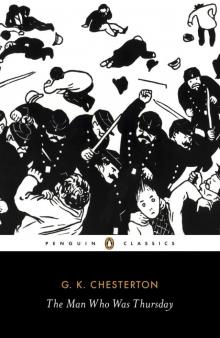 The Man Who Was Thursday: A Nightmare
The Man Who Was Thursday: A Nightmare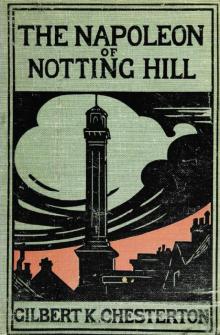 The Napoleon of Notting Hill
The Napoleon of Notting Hill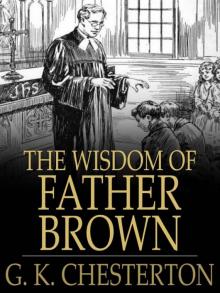 The Wisdom of Father Brown
The Wisdom of Father Brown G K Chesterton- The Dover Reader
G K Chesterton- The Dover Reader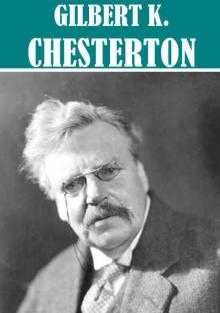 The Essential G. K. Chesterton
The Essential G. K. Chesterton The Trees of Pride
The Trees of Pride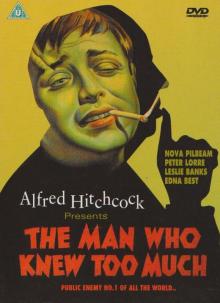 The Man Who Knew Too Much
The Man Who Knew Too Much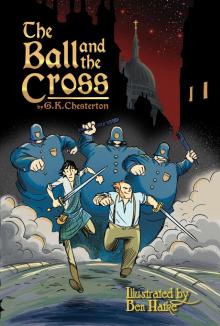 The Ball and the Cross
The Ball and the Cross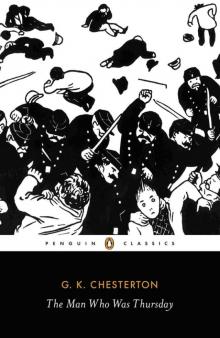 The Man Who Was Thursday (Penguin ed)
The Man Who Was Thursday (Penguin ed)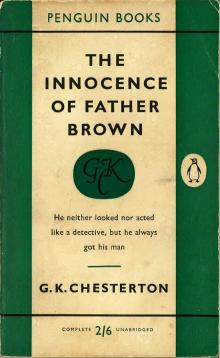 The Innocence of Father Brown
The Innocence of Father Brown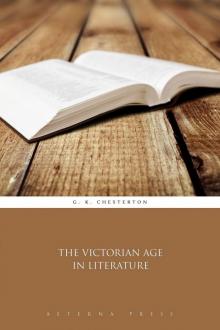 The Victorian Age in Literature
The Victorian Age in Literature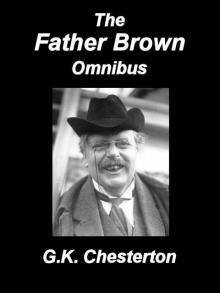 Father Brown Omnibus
Father Brown Omnibus Murder On Christmas Eve
Murder On Christmas Eve The Blue Cross
The Blue Cross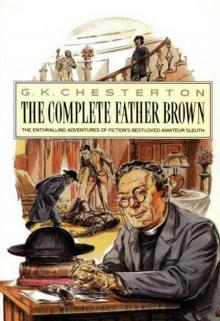 The Complete Father Brown Mysteries Collection
The Complete Father Brown Mysteries Collection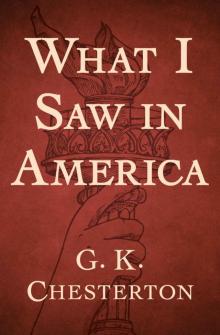 What I Saw in America
What I Saw in America